Journal Articles

Irrigation farming is vital for food security in Malawi, but it also creates breeding grounds for vectors such as mosquitoes and snails, increasing the risk of malaria and schistosomiasis. This qualitative study, conducted under the Shire Valley Vector Control Project, explored stakeholder perspectives on vector-borne disease (VBD) control in irrigation areas. Findings show that Malawi lacks policies and coordinated strategies to manage VBD risks in irrigation schemes, with health and agriculture sectors often working in silos. The study calls for integrating vector control into irrigation policies and projects, adopting the One Health and Integrated Vector Management (IVM) approaches, strengthening entomological […]

Irrigation farming has raised concerns about the steady transmission and introduction of new vector-borne infectious diseases (VBD) in the areas involved. This systematic review aimed to determine interventions that are effective for the management and control of VBDs in irrigation areas in sub-Saharan Africa (SSA). We searched the literature on VBD interventions in SSA from published and grey literature without specifying the publication year. A search strategy identified 7768 records from various databases, and after screening, 16 were included in the final analysis. Results showed various VBD control interventions were effective, including indoor residue spray (IRS), insect-treated nets (ITN), larva […]
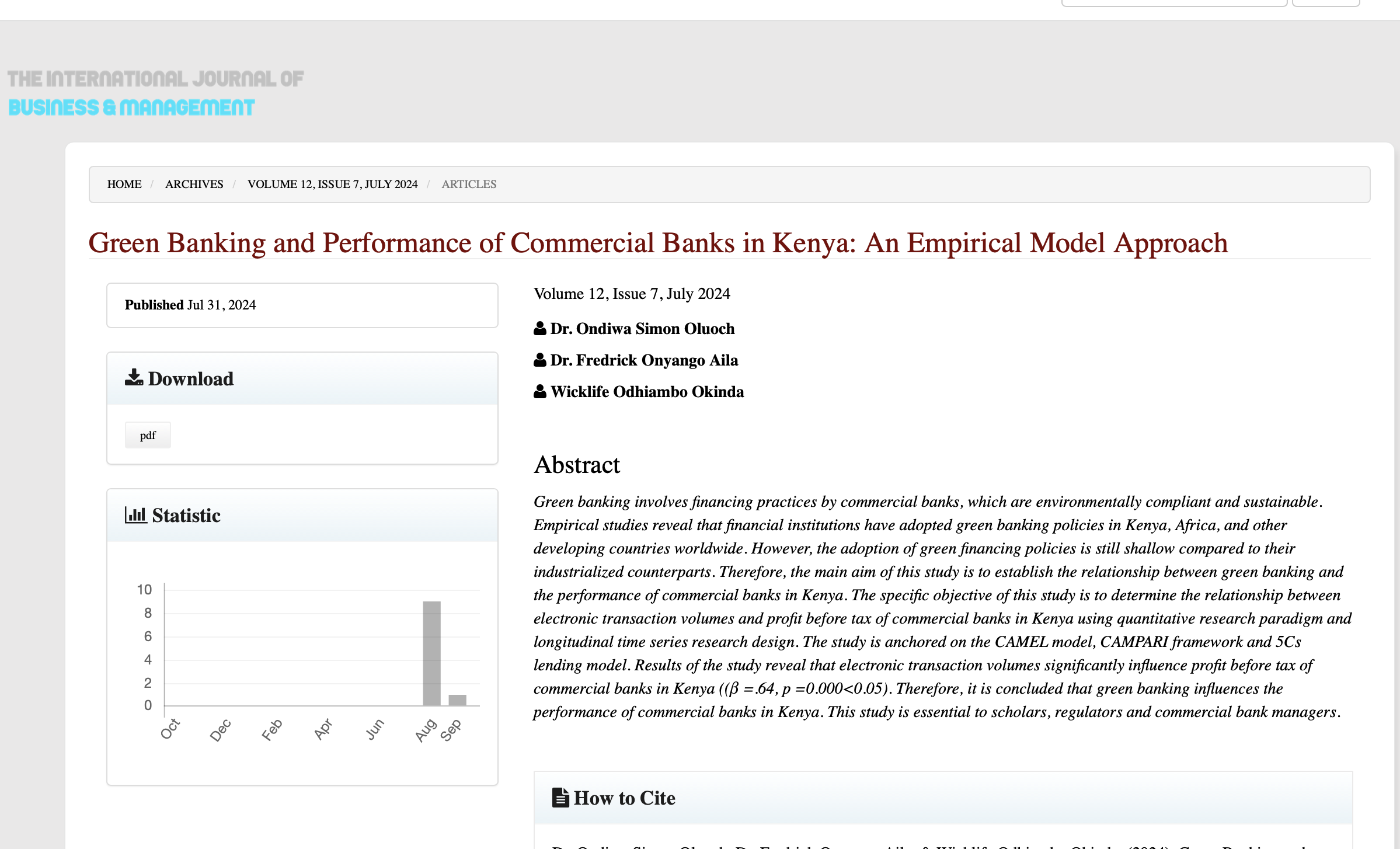
Green banking involves financing practices by commercial banks, which are environmentally compliant and sustainable. Empirical studies reveal that financial institutions have adopted green banking policies in Kenya, Africa, and other developing countries worldwide. However, the adoption of green financing policies is still shallow compared to their industrialized counterparts. Therefore, the main aim of this study is to establish the relationship between green banking and the performance of commercial banks in Kenya. The specific objective of this study is to determine the relationship between electronic transaction volumes and profit before tax of commercial banks in Kenya using quantitative research paradigm and longitudinal time series research design. The study is anchored on the CAMEL model, CAMPARI framework and 5Cs lending model. Results of the study reveal that electronic transaction volumes significantly influence profit before tax of commercial banks in Kenya ((β =.64, p =0.000<0.05). Therefore, it is concluded that green banking influences the performance of commercial banks in Kenya. This study is essential to scholars, regulators and commercial bank managers.
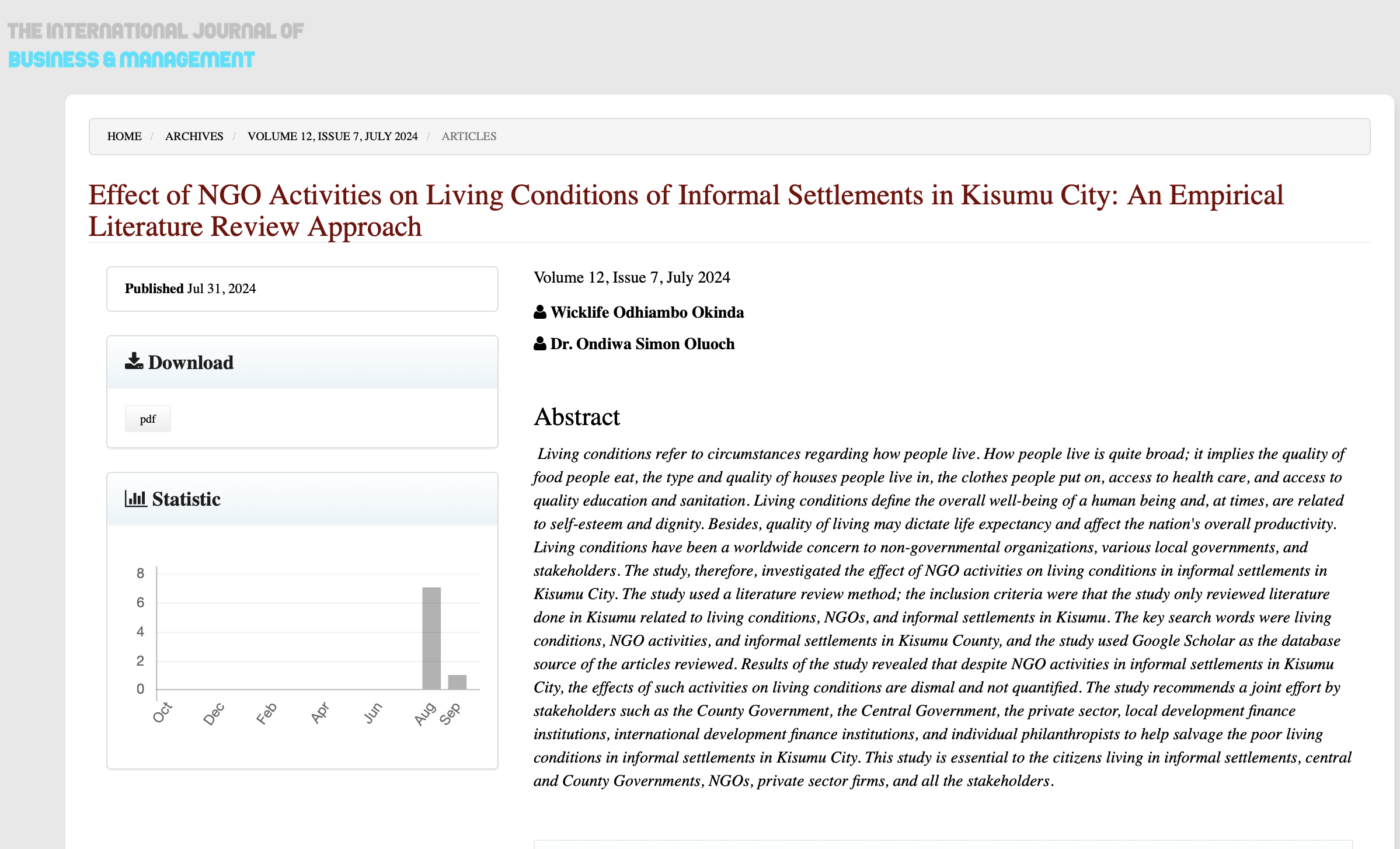
Living conditions refer to circumstances regarding how people live. How people live is quite broad; it implies the quality of food people eat, the type and quality of houses people live in, the clothes people put on, access to health care, and access to quality education and sanitation. Living conditions define the overall well-being of a human being and, at times, are related to self-esteem and dignity. Besides, quality of living may dictate life expectancy and affect the nation’s overall productivity. Living conditions have been a worldwide concern to non-governmental organizations, various local governments, and stakeholders. The study, therefore, investigated the effect of NGO activities on living conditions in informal settlements in Kisumu City. The study used a literature review method; the inclusion criteria were that the study only reviewed literature done in Kisumu related to living conditions, NGOs, and informal settlements in Kisumu. The key search words were living conditions, NGO activities, and informal settlements in Kisumu County, and the study used Google Scholar as the database source of the articles reviewed. Results of the study revealed that despite NGO activities in informal settlements in Kisumu City, the effects of such activities on living conditions are dismal and not quantified. The study recommends a joint effort by stakeholders such as the County Government, the Central Government, the private sector, local development finance institutions, international development finance institutions, and individual philanthropists to help salvage the poor living conditions in informal settlements in Kisumu City. This study is essential to the citizens living in informal settlements, central and County Governments, NGOs, private sector firms, and all the stakeholders.
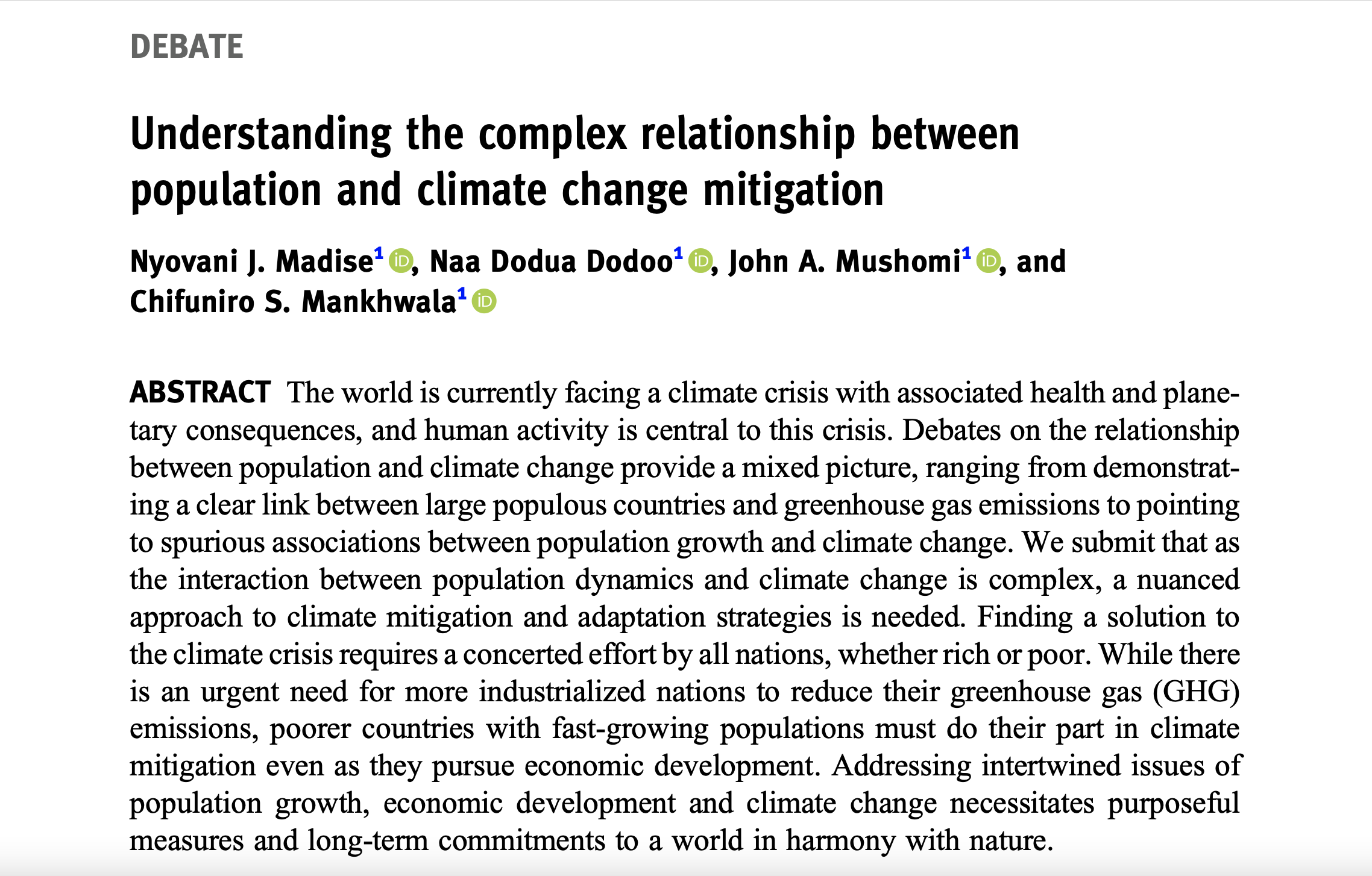
Theworldiscurrentlyfacingaclimatecrisiswithassociatedhealthandplane- tary consequences, and human activity is central to this crisis. Debates on the relationship between population and climate change provide a mixed picture, ranging from demonstrat- ing a clear link between large populous countries and greenhouse gas emissions to pointing to spurious associations between population growth and climate change. We submit that as the interaction between population dynamics and climate change is complex, a nuanced approach to climate mitigation and adaptation strategies is needed. Finding a solution to the climate crisis requires a concerted effort by all nations, whether rich or poor. While there is an urgent need for more industrialized nations to reduce their greenhouse gas (GHG) emissions, poorer countries with fast-growing populations must do their part in climate mitigation even as they pursue economic development. Addressing intertwined issues of population growth, economic development and climate change necessitates purposeful measures and long-term commitments to a world in harmony with nature.
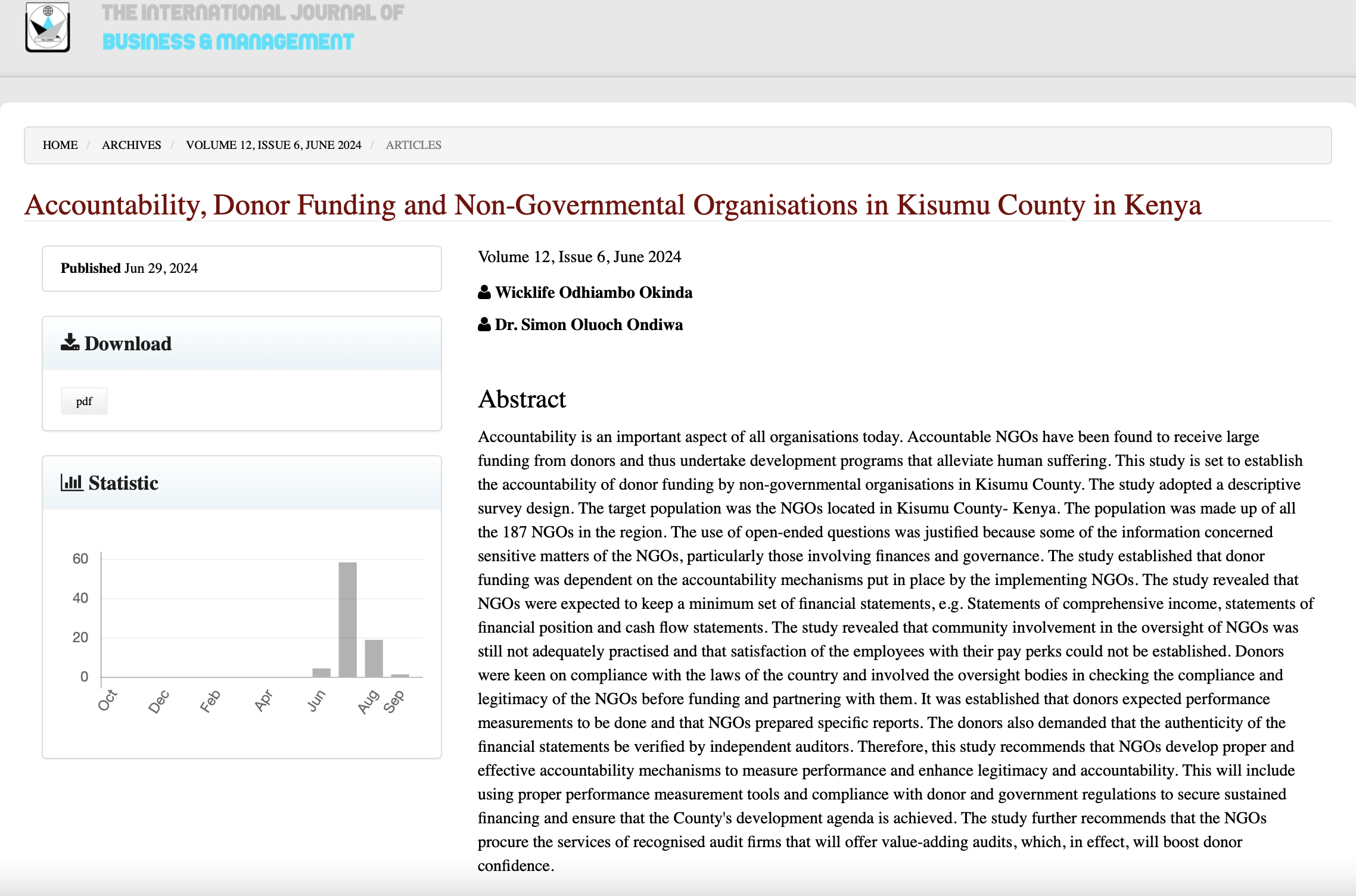
Accountability is an important aspect of all organisations today. Accountable NGOs have been found to receive large funding from donors and thus undertake development programs that alleviate human suffering. This study is set to establish the accountability of donor funding by non-governmental organisations in Kisumu County. The study adopted a descriptive survey design. The target population was the NGOs located in Kisumu County- Kenya. The population was made up of all the 187 NGOs in the region. The use of open-ended questions was justified because some of the information concerned sensitive matters of the NGOs, particularly those involving finances and governance. The study established that donor funding was dependent on the accountability mechanisms put in place by the implementing NGOs. The study revealed that NGOs were expected to keep a minimum set of financial statements, e.g. Statements of comprehensive income, statements of financial position and cash flow statements.
The study revealed that community involvement in the oversight of NGOs was still not adequately practised and that satisfaction of the employees with their pay perks could not be established. Donors were keen on compliance with the laws of the country and involved the oversight bodies in checking the compliance and legitimacy of the NGOs before funding and partnering with them. It was established that donors expected performance measurements to be done and that NGOs prepared specific reports. The donors also demanded that the authenticity of the financial statements be verified by independent auditors. Therefore, this study recommends that NGOs develop proper and effective accountability mechanisms to measure performance and enhance legitimacy and accountability. This will include using proper performance measurement tools and compliance with donor and government regulations to secure sustained financing and ensure that the County’s development agenda is achieved. The study further recommends that the NGOs procure the services of recognised audit firms that will offer value-adding audits, which, in effect, will boost donor confidence.
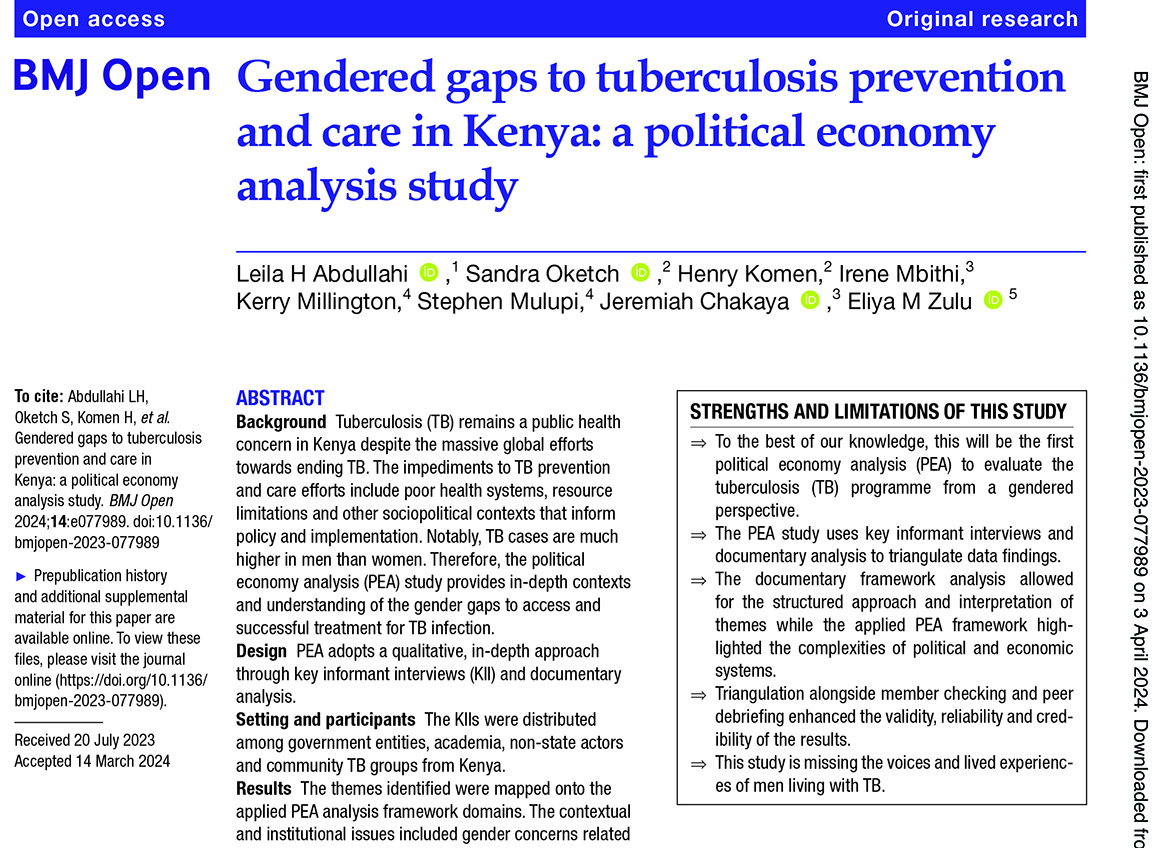
Tuberculosis (TB) remains a public health concern in Kenya despite the massive global efforts towards ending TB. Notably, TB cases are much higher in men than women. This political economy analysis (PEA) study provides in-depth contexts and understanding of the gender gaps to access and successful treatment for TB infection. The impediments to TB prevention and care efforts include poor health systems, resource limitations and other sociopolitical contexts that inform policy and implementation. Broad contextual factors identified from the PEA widen the disparity in targeted gender efforts toward men. Following the development of effective TB policies and strategies, it is […]
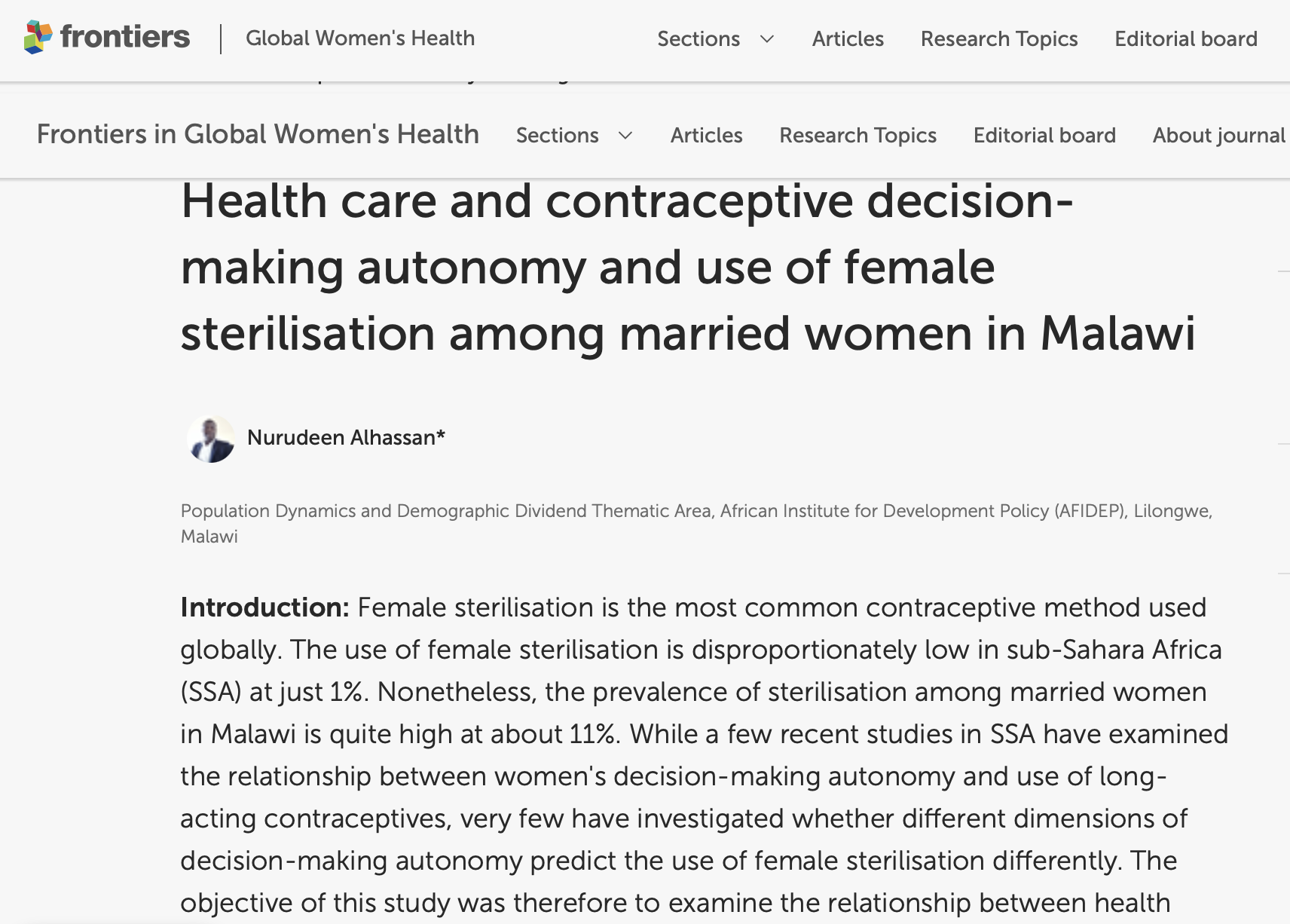
Female sterilisation is the most common contraceptive method used globally. The use of female sterilisation is disproportionately low in sub-Sahara Africa (SSA) at just 1%. Nonetheless, the prevalence of sterilisation among married women in Malawi is quite high at about 11%. While a few recent studies in SSA have examined the relationship between women’s decision-making autonomy and use of long-acting contraceptives, very few have investigated whether different dimensions of decision-making autonomy predict the use of female sterilisation differently. The objective of this study was therefore to examine the relationship between health care and contraceptive decision-making autonomy and the use of […]
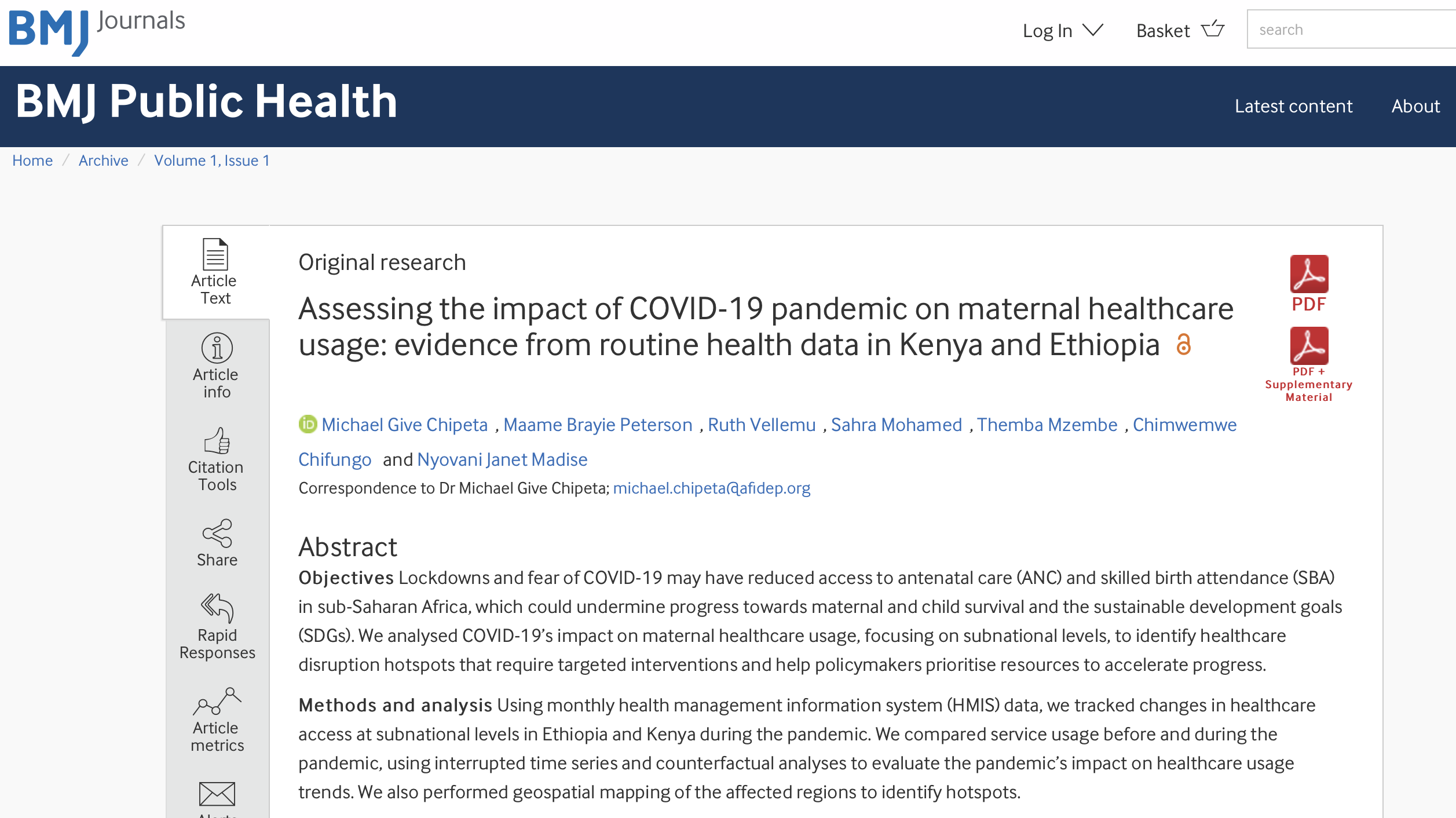
The devastating impacts and lessons learnt from other epidemic contexts show that health systems in low-income and middle-income countries (LMICs) and fragile and humanitarian contexts have a low capacity to implement an emergency response during disease outbreaks such as the COVID-19 pandemic caused by the SARS-CoV-2 virus.1 2 Such unprecedented emergency and humanitarian situations burden health systems, which, even before the disease outbreak, have struggled to provide quality essential services. Very few studies have demonstrated how COVID-19 affects progress towards achieving sustainable development goals (SDGs), especially SDG number 3 in countries including Kenya and Ethiopia. In this study, we assessed […]
Determinants of causes of death among Women of Reproductive Age (WRA) are complex and cut across distal and proximate factors but not intermediate factors. There is therefore, the need to expand the scope of the intermediate variables in future studies. In addition, marital status is a key determinant of the causes of death among WRA in the Kintampo North Municipality and Kintampo South District during the study period. Authors: Sulemana Watara Abubakari, Nurudeen Alhassan, Robert Adda, Kwaku Poku Asante and ayaga Agula Bawah Full Text Link: https://www.tandfonline.com/doi/full/10.1080/27707571.2022.2109300
Many young women experience important key life transitions during adolescence and early adulthood, such as initiation of sexual activity, first use of contraceptives, marriage, and childbirth. For young women to be able to plan and manage their lives, it is critical to understand how these life events intersect and shape their contraceptive decision-making. This study explored young women’s contraceptive method use trajectories, including the factors that influence contraceptive decision-making throughout adolescence and youth. Authors: Lisa M Calhoun, Mahua Mandal, Bernard Onyago, Erick Waga, Courtney McGuire, Eliya M Zulu, Thomas van den Akker, lenka Benova, Therese Delvaux, Ilene S Speizer Full […]
Household overcrowding is a serious public health threat associated with high morbidity and mortality. Rapid population growth and urbanisation contribute to overcrowding and poor sanitation in low-income and middle- income countries, and are risk factors for the spread of infectious diseases, including COVID-19, and antimicrobial resistance. Many countries do not have adequate surveillance capacity to monitor household overcrowding. Geostatistical models are therefore useful tools for estimating household overcrowding. This study, aimed to estimate household overcrowding in Africa between 2000 and 2018 by combining available household survey data, population censuses, and other country-specific household surveys within a geostatistical framework. Authors: Michael G […]

